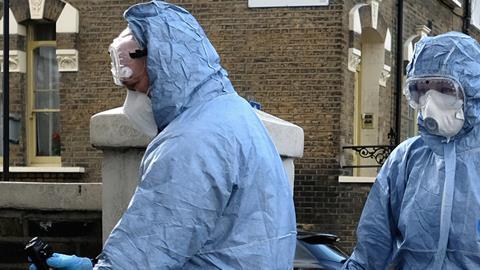According to the government on 29 April, the UK Covid-19 peak has passed.
This will be small comfort to the families of those who have died of it. On 28 April the ONS recorded 8,758 deaths referable to Covid-19 in the week ending 17 April (the last week for which the figures were available), a significant increase on the 6,213 Covid-19 related deaths in the previous week. The ONS has the total number of Covid-19 deaths between 1 March and 18 April as 20,283. Extrapolation to 1 May would suggest a total number of deaths at somewhere around 38,000.


Some of these deaths are amongst workers who do not enjoy the luxury of working from home or being furloughed on 80% of wages. Workers who have died may have contracted the illness travelling to work. Others will have contracted it at work because their employer failed to provide sufficient personal protective equipment (PPE), failed to clean work surfaces and equipment or failed to arrange work so as to preserve social distancing.
The most notorious of the failures to provide PPE are in the health and social care sector. The government says it is straining sinews to procure more PPE. The media are spilling tears over the plight of inadequately protected health and care workers. The distressing disproportionate numbers of deaths of BAME workers is triggering investigations. There seems to be a widespread acceptance that whilst the supply of adequate PPE is obviously desirable, global competition in the face of an implacable pandemic has meant that workers must put up with shortages. Our heroic front line workers make do as best they can and are applauded for it each Thursday evening.
Meanwhile they risk their lives and some die.
What we lawyers cannot ignore is that the supply of PPE to employees exposed to risk is not merely a matter of good practice or even moral obligation. It is a longstanding legal duty.
The requirement to protect is not limited to health and care workers but all employees and, under EU law, all workers.
The common law places an obligation on employers to provide and maintain a safe place of work, a safe system of work and safe and adequate equipment for the job. A failure to take reasonable steps to provide and maintain any of these can entitle the employee to sue for damages if injured or made ill by the failure. Incompetence in failing to place an order for sufficient PPE to protect against a reasonably foreseeable disease is unlikely to be a sufficient defence.
Statute has a lot more to say in the form of the Health and Safety at Work Act 1974, and, in particular, the regulations made under it which follow EU Directives.
The Personal Protective Equipment at Work Regulations 1992 requires that ‘every employer shall ensure that suitable personal protective equipment is provided to his employees who may be exposed to a risk to their health…’The PPE must be ‘effective to prevent or adequately control the risk or risks involved’. This mandatory duty too cannot be evaded by a claim of ineptitude on the part of the employer in failing to order the PPE in time.
There are statutory duties to maintain a safe place of work, work station and access to and from; to provide washing facilities, to make proper risk assessments and to report the contraction of disease at work
It is a criminal offence on the part of the employer to breach these duties and, if ‘due to the act or default of some other person, that other person shall be guilty of the offence’ as well as the employer. Third parties and managers cannot shelter from personal criminal responsibility behind corporate or Crown employers. Again incompetence is no defence.
Those responsible for sending in our health and care workers to face the incontrovertible risk of contracting Covid-19 without adequate PPE might reflect on these provisions.
No doubt most employers are trying hard. But, in relation to the NHS it is now known that needs were foreseen but opportunities missed.
The Health and Safety Executive and Local Authority Environmental Health Officers are responsible for enforcement of the legislation. No doubt the austerity cuts to staff and resources explains why no improvement notices, prohibition notices or prosecutions for the failure to provide PPE in the face of Covid-19 have been reported.
The latest government guidance (27 April 2020) re-iterates the need for PPE.
Whilst welcome, there are worrying aspects to it. It downgrades the extent of PPE advised in some situations and it allows repeated or extended use of some equipment. Strikingly, the guidance does not emphasise that PPE in the face of danger is mandatory.
Neither does it remind workers that the Employment Rights Act 1996 makes it unlawful to penalise a worker who refuses to work when faced with what she reasonably believes to be serious and imminent danger. The Royal College of Nursing recently issued cautious advice to its members to this effect.
It is troubling that, in this time of crisis, legal requirements have been overlooked. We think that it is precisely because this is a time of crisis that that we should be astute to uphold the law and enforce the rights of employees and the duties of employers.
Lord Hendy QC and Jane Deighton
































1 Reader's comment